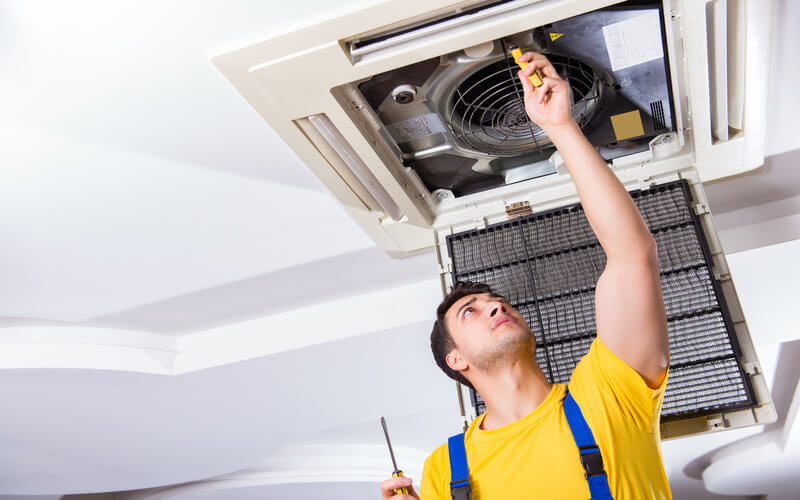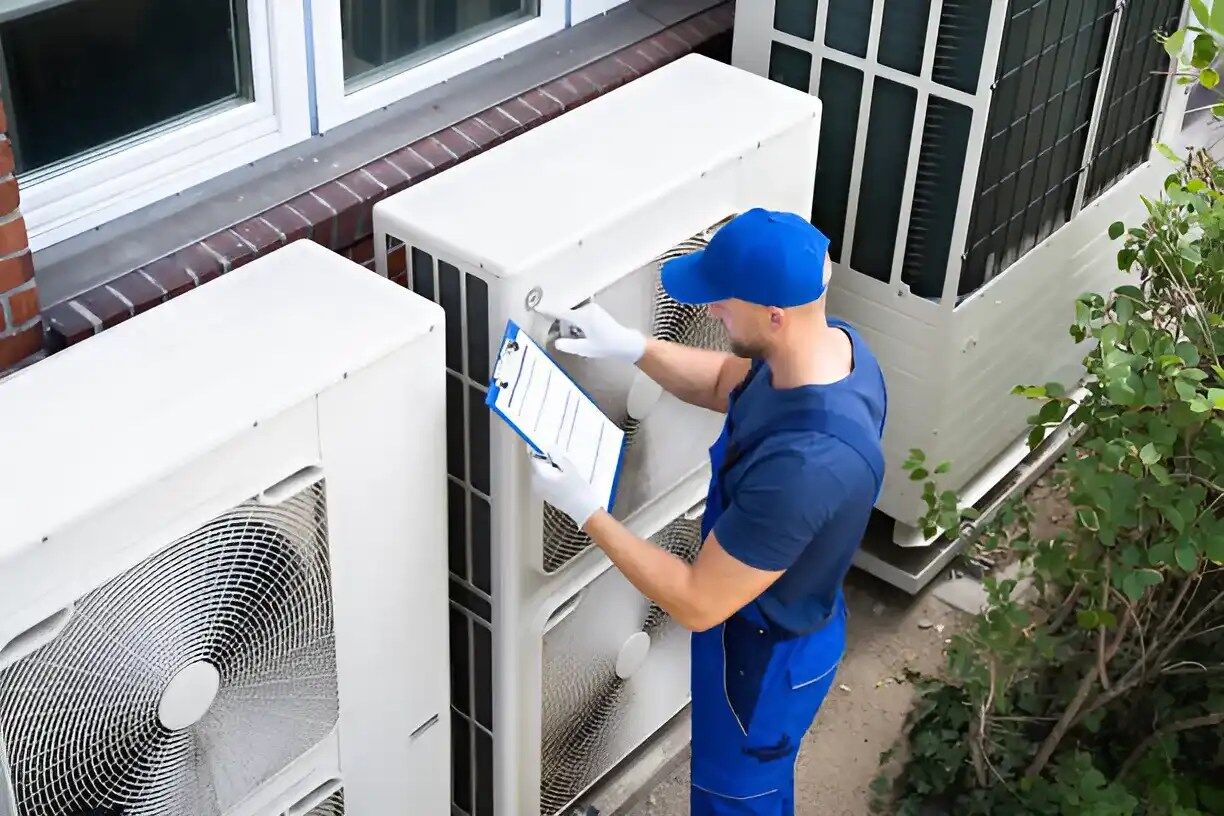Repair Air Conditioner Near Me for Dummies
Repair Air Conditioner Near Me for Dummies
Blog Article
The Single Strategy To Use For Ac Repair
Fix Air Conditioner: Professional Cooling System Repair Ensures Your Home Stays Comfy Throughout The Year
Types of Air Conditioning Systems
When tackling air conditioning repair work, comprehending the type of air conditioning system you're dealing with can save time, money, and irritation. Ever wondered why some units cool a room faster than others? Or why particular systems seem to break down more regularly? Let's peel back the layers.
Central Air Conditioning
Fix Air Conditioner Can Be Fun For Anyone
Imagine a cool breeze streaming through a whole home, whispering comfort into every corner. Central air systems do precisely that. They utilize a network of ducts to disperse cooled air, counting on a compressor and condenser outside, coupled with an evaporator coil inside. However when this complex beast falters, determining the issue can be like finding a needle in a haystack.
Split Systems

Split systems are a popular option for lots of homes-- part indoor unit, part outdoor compressor. They offer flexibility and efficiency, but their double nature indicates repair can include either part. Have you ever heard an unusual noise outside your home just to discover the indoor system isn't cooling? That's a traditional sign of a split system glitch.
Little Known Questions About Ac Air Conditioner Repair.
Window Units
These compact warriors fight summer heat by fitting comfortably into a window frame. They integrate all elements into a single box. Their simplicity typically indicates fewer repair headaches, however disregarding filters or permitting debris buildup can cause decreased performance or breakdowns.
Ductless Mini-Splits
Not known Facts About Air Conditioning Repair Near Me
Ductless systems bypass ductwork entirely, making them perfect for homes without existing ventilation. They're quiet, efficient, and remarkably durable. Yet, when repair work are required, professionals must be proficient at dealing with refrigerant lines and electrical connections-- no small task.
Quick Referral Table
| Type | Key Features | Typical Repair Work Issues |
|---|---|---|
| Central air conditioning | Ductwork, whole-house cooling | Duct leaks, compressor failure |
| Split System | Indoor & & outside units | Refrigerant leaks, fan motor problems |
| Window System | All-in-one, easy setup | Dirty filters, electrical faults |
| Ductless Mini-Split | No ducts, zoned cooling | Line leaks, sensing unit malfunctions |
Excitement About Ac Repair
Deciphering one of the most Frequent AC Problems
Have you ever questioned why your air conditioner suddenly stops cooling throughout a sweltering afternoon? One typical offender is a filthy or blocked air filter. This sly bad guy restricts airflow, requiring your system to work overtime, which not just minimizes effectiveness however can also result in premature breakdowns. Imagine attempting to breathe through a headscarf soaked in dust-- it's tiring!
Another regular misstep is refrigerant leakages. These invisible leakages do not simply reduce cooling power but can likewise harm the compressor, the heart of your AC unit. How often do you look for unusual hissing noises or ice formation on the coils? Catching these indications early can save you from costly repair work down the line.
Beyond the Fundamentals: Lesser-Known Issues
Excitement About Ac Repair
Sometimes, the thermostat itself is the troublemaker. Miscalibrated or malfunctioning thermostats send mixed signals, causing the air conditioning to cycle erratically. Ever skilled your a/c switching on and off in fast succession? That's called brief cycling, a sneaky performance drainer that can wear out parts quicker than you 'd anticipate.
Electrical problems, such as worn circuitry or a malfunctioning capacitor, might hide below the surface area. AC Air Conditioner Repair. These frequently manifest as air conditioning systems failing to start or all of a sudden shutting down. An expert eye knows to test these components with precision tools, something a casual glance won't reveal
Expert Tips for Diagnosing Common AC Concerns
Unknown Facts About Ac Air Conditioner Repair
- Check and change air filters routinely-- every 1 to 3 months depending on use and environment.
- Listen for unusual noises like rattling or buzzing that could signal loose parts or electrical faults.
- Inspect the outdoor unit for debris or clogs that restrain airflow and trigger overheating.
- Search for frost buildup on evaporator coils, a tip towards refrigerant issues or air flow constraints.
- Test the thermostat settings and recalibrate if the temperature level readings feel off.
Quick Referral Table: Symptoms & & Probable Triggers

| Symptom | Probable Cause | Expert Pointer |
|---|---|---|
| Warm air blowing | Low refrigerant or dirty coils | Clean coils and inspect for leakages right away |
| Short biking | Thermostat problems or large unit | Change thermostat settings and consult sizing guidelines |
| System won't begin | Electrical faults or capacitor failure | Test circuitry and replace capacitors as required |
| Water leakage | Obstructed drain line or frozen evaporator | Clear drain lines and examine for coil icing |
DO IT YOURSELF AC Upkeep Tips
Excitement About Ac Repair
Ever observed your air conditioner sputtering like an old engine on a hot summertime day? Neglecting subtle indications typically means more than simply a sweaty afternoon-- it's a prelude to unanticipated AC repair work expenses. But what if you could capture those whispers before they become wails? Regular DIY maintenance can be your first line of defense.
Simple Steps to Keep Your Air Conditioning Running Efficiently
The 45-Second Trick For Air Conditioning Repair Near Me
- Tidy or Change Filters: A clogged filter is like trying to breathe through a scarf. Every 1-3 months, examine and swap out your filters. It enhances air flow and efficiency, preventing compressor stress.
- Check the Condenser Coils: Dust and particles function as unnoticeable blankets smothering your unit's cooling power. Gently brush or vacuum the coils, but prevent extreme chemicals that may wear down the metal.
- Inspect the Drain Line: When was the last time you looked at your drain pan? A blocked drain can trigger water leaks and foster mold development. Flushing it with a vinegar service regular monthly keeps the flow clear.
- Seal and Insulate: Are your ductworks whispering leakages? Sealing spaces with mastic or foil tape improves efficiency and reduce unequal cooling.
Pro Tips Beyond the Essentials
- Step your unit's voltage to catch subtle electrical wear before it stimulates big issues.
- Listen for unusual hums or rattles-- these acoustic breadcrumbs frequently indicate loose parts or stopping working motors.
- Keep outside units shaded however make sure at least 2 feet of clearance around them for optimum air flow.
Ask yourself: Are you hearing your a/c's peaceful SOS or just waiting on it to scream? Taking some time for DIY air conditioning maintenance changes reactive repair work into here proactive care, conserving sweat, tension, and yes, money.
4 Simple Techniques For Fix Air Conditioner
Why Expertise in A/c Repair Work Matters
Picture this: your AC unit sputters and groans throughout a scorching afternoon, leaving you sweltering inside. Would you trust a beginner fumbling with delicate components, or would you seek the peace of mind of a professional AC professional!.?.!? The intricacies of contemporary air conditioning systems require precision and experience. A small mistake can intensify a small breakdown into an expensive disaster.
Not known Facts About Ac Repair Near Me
Hidden Complexities Behind the Cool Breeze
Many undervalue the layers hidden underneath the sleek outside of an air conditioner unit - AC Repair. From refrigerant leaks that quietly drain pipes efficiency to defective thermostats that misread temperatures, these problems require more than a standard toolkit. Experts possess an eager eye for identifying issues that average homeowners ignore
Important Tips for Picking the Right Service Technician
Air Conditioning Repair Near Me Fundamentals Explained
- Certification and Training: Confirm qualifications; a service technician trained in the most recent HVAC innovations is important.
- Experience with Particular Systems: Not all AC units are developed equal; discover somebody acquainted with your design's peculiarities.
- Diagnostic Method: Skilled technicians utilize sophisticated tools-- like electronic leak detectors and thermal imaging-- to determine covert faults.
What to Expect from a Pro's Diagnostic Process
| Action | Function | Specialist Insight |
|---|---|---|
| Visual Evaluation | Recognize apparent wear or damage | Search for deterioration or unusual sounds-- an indicator frequently disregarded |
| Pressure Testing | Find refrigerant leaks | Subtle pressure drops can mean micro leaks undetectable to the naked eye |
| Electrical Checking | Ensure circuit integrity | Loose connections can imitate serious mechanical failures |
Some Ideas on Air Conditioning Repair You Need To Know
Why DIY Typically Falls Short
Appealing as it is to tinker with your AC unit, DIY repairs regularly miss out on the source. Topping off refrigerant might briefly cool your space but neglects leakages that worsen over time. Professional professionals don't simply patch signs; they hunt down the underlying mechanical and electrical faults that sap performance.
The 5-Minute Rule for Ac Air Conditioner Repair
Concerns to Ask Before Employing
- What diagnostic tools do you use to determine problems?
- Can you explain the repair work procedure and expected outcomes?
- Are you knowledgeable about the refrigerants suitable with my system?
- Do you follow safety procedures for managing electrical parts?